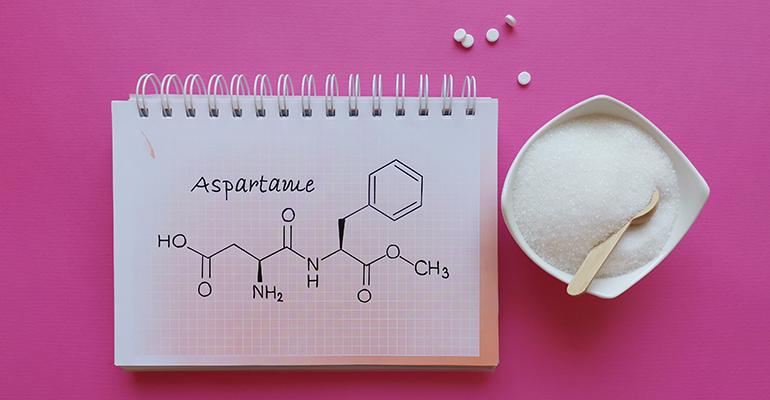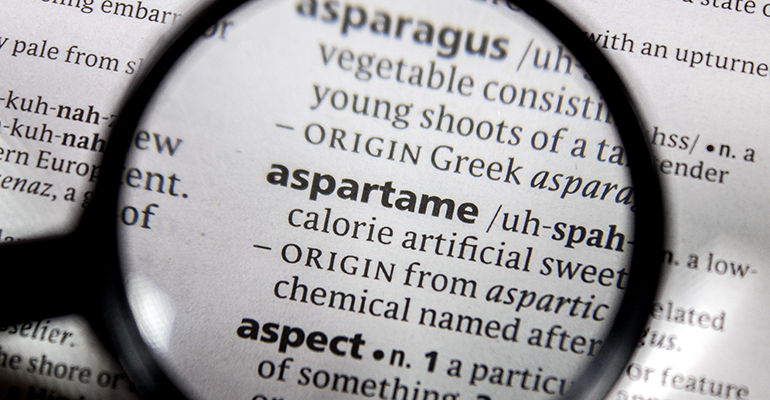News
JECFA expert committee reconfirms aspartame safety at approved levels
20 Jul 2023
The Joint FAO/WHO Expert Committee on Food Additives (JECFA) has found “limited evidence” that aspartame is a possible carcinogenic, yet the sweetener has received a classification of “possibly carcinogenic”.
After weeks of speculation, JECFA, which is administered jointly by the Food and Agriculture Organization of the United Nations (FAO) and the World Health Organization (WHO), has concluded that aspartame is safe for people to consume at the established acceptable daily intake (ADI).

However, despite its reconfirmation, more research and guidance may be needed to build consumer trust, as the International Agency for Research on Cancer (IARC) has classed aspartame as possibly carcinogenic to humans (Group 2B).
On 14 July, IARC and JECFA released the results of their aspartame safety reviews, reconfirming the safety of aspartame and citing there is “limited evidence” for carcinogenicity in humans. JECFA examined IARC’s conclusions and found no concern for human health.
Safety classification
IARC gave aspartame a Group 2B classification, based on there being limited evidence for cancer in humans – specifically, hepatocellular carcinoma, a type of liver cancer. The results also found limited evidence for cancer in experimental animals and limited evidence related to the possible mechanisms for causing cancer.
Group 2B is the third-highest of four levels, the WHO said, adding that it is typically used when there is limited but not convincing evidence for cancer in humans, or when there is the presence of convincing evidence for cancer in experimental animals, but not both.
However, IARC is not an official safety organisation, according to the International Sweeteners Association (ISA). “IARC is not a food safety body and its 2B classification does not consider intake levels nor actual risk, making an IARC review far less comprehensive than the thorough reviews conducted by food safety bodies like JECFA and potentially confusing for consumers,” the trade body said.
The ISA states that the 2B classification puts aspartame in the same category as kimchi and other pickled vegetables. “IARC would be the first to say that they don’t suggest people should stop using kimchi at meals,” the ISA said in its statement.
In response to the published findings, the European Food Information Council (EUFIC) released an article drawing attention to the fact the IARC Monographs programme conducts hazard assessments, while JECFA conducts risk assessments.
IARC’s process is used to assess whether a chemical can cause cancer, rather than whether it is likely to do so under real-use conditions, EUFIC said. On the other hand, the JECFA panel determines how likely it is that a specific type of harm will occur under specific conditions. JECFA’s risk assessments determine the probability of a specific type of harm, such as cancer, to occur under certain conditions and exposure levels.
Reconfirmed daily intake
JECFA reaffirmed that the daily intake of aspartame at 40 mg/kg body weight is still acceptable, concluding that after evaluating the data, there was no sufficient reason to change the recommended daily consumption guidance.
“JECFA has once again reaffirmed aspartame’s safety after conducting a thorough, comprehensive and scientifically rigorous review,” Frances Hunt-Wood, secretary-general of the ISA, told Ingredients Network. “Aspartame, like all low-/no-calorie sweeteners, when used as part of a balanced diet, provides consumers with choice to reduce sugar intake, a critical public health objective.”
 © AdobeStock/sharafmaksumov
© AdobeStock/sharafmaksumov
In its statement, the ISA “applauds the WHO’s reaffirmation of aspartame's safety” and describes aspartame as “one of the most thoroughly researched ingredients in the world”. The ISA said the report’s conclusions were consistent with the findings of more than 90 global food safety agencies that have confirmed the sweetener’s safety, including the European Food Safety Authority (EFSA), which has reviewed aspartame twice, and the US Food and Drug Administration (FDA).
More research needed
“The assessments of aspartame have indicated that, while safety is not a major concern at the doses which are commonly used, potential effects have been described that need to be investigated by more and better studies,” said Dr Francesco Branca, director of the WHO’s Department of Nutrition and Food Safety.
The IARC and JECFA evaluations considered scientific data collected from various sources, including peer-reviewed papers, governmental reports, and studies conducted for regulatory purposes to assess the impact of aspartame.
“The findings of limited evidence of carcinogenicity in humans and animals, and of limited mechanistic evidence on how carcinogenicity may occur, underscore the need for more research to refine our understanding on whether consumption of aspartame poses a carcinogenic hazard,” said Dr Mary Schubauer-Berigan, of the IARC Monographs programme.
“We need better studies with longer follow-up and repeated dietary questionnaires in existing cohorts,” said Dr Moez Sanaa, head of the WHO’s Standards and Scientific Advice on Food and Nutrition Unit. “We need randomised controlled trials, including studies of mechanistic pathways relevant to insulin regulation, metabolic syndrome, and diabetes, particularly as related to carcinogenicity.”
In a statement, IARC and the WHO said they will continue to look at new evidence and encourage independent research groups to build further studies on the possible link between aspartame exposure and consumer health effects.
Scientists at EFSA are currently re-evaluating the safety of a related sweetener, the salt of aspartame-acesulfame (E 962). “In this context, we will carefully consider all relevant new studies since our assessment of aspartame in 2013,” an EFSA spokesperson told Ingredients Network ahead of the release of JECFA’s findings. “We are updating our dietary exposure assessment of aspartame as part of this work.”
